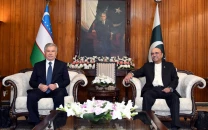Dealing with nuclear North Korea
North Korea announced that it had successfully tested a massively powerful thermonuclear device

The writer is National desk
in-charge at The Express Tribune.
He tweets @hammadsarfraz
The hermit state's nuclear experimentation triggered an instant earthquake and within hours it developed into a full-blown geopolitical tremor that effectively got the world in a tizzy. Not only did the announcement draw scepticism from the pariah state's Western opponents but also irked Beijing, its sole economic and political benefactor.
If the test was successful, as North Korea boisterously claimed, the detonation would serve as a major breakthrough for the totalitarian state's indigenous nuclear-weapons programme. Not only does this latest acquisition seriously undermine international non-proliferation efforts, it is also bound to act as a de-stabilising force for the region that is already embroiled in a power struggle on many fronts. Yet despite decades of sabre-rattling by the authoritarian state, Western powers haven't displayed their usual alacrity in dealing with the escalating situation in the bitterly divided Korean peninsula.
During his four years in power, Kim Jong-un has veered towards declaring a quasi-state of war against neighbouring South Korea and the United States. In comparison, the dynastic strongman has also proved to be far more ruthless than his predecessors. He has reshuffled crucial posts of power and executed potential opponents within his inner circle, including one of his pro-Beijing uncles.
But regardless of Pyongyang's chronic record of bravado and its usual oscillation between periods of aggressive rhetoric and weapons tests, the very guardians of global peace have failed to confront the reclusive state's leadership. While the West was busy dealing with lesser potent dictators elsewhere in the world, the recalcitrant regime was allowed to march ahead with its Machiavellian agenda.
Even now as South Korea rallies countries to censure the North Korean regime for conducting a fourth nuclear weapons test since 2006, the threats of sanctions have a familiar hollow ring. As usual, incoherent calls for fresh restrictions on the rogue state lack clarity and direction.
History tells us that North Korea's previous nuclear tests have evoked widespread condemnation, including sanctions that have effectively crippled its economy. But as tough as they were, such responses did nothing to deter Pyongyang from advancing its nuclear capabilities. Perhaps the dividends from the Iran nuclear deal may be a better incentive to nudge North Korea towards instituting nuclear controls as attempts to impose fresh restrains on its supply line at this point are likely to have little effect.
So if global powers sincerely wish to denuclearise the Korean peninsula, they must now look towards China, which given its influence over North Korea, can bring the pariah state on to the negotiating table.
Published in The Express Tribune, January 27th, 2016.



















COMMENTS
Comments are moderated and generally will be posted if they are on-topic and not abusive.
For more information, please see our Comments FAQ